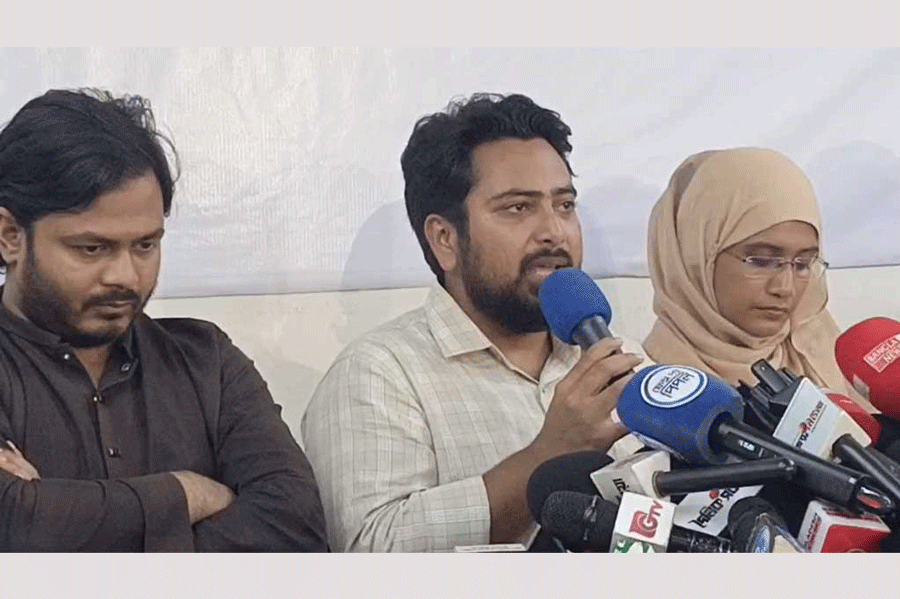Saif
Senior Member
- Joined
- Jan 24, 2024
- Messages
- 16,508
- Likes
- 8,140
- Nation

- Residence

- Axis Group


‘Won’t leave’ reform process to elected parliament, says Nahid
National Citizen Party (NCP) Convenor Nahid Islam has said his party “will not hand over” the reform process outlined in the July Charter to the next elected parliament. Instead, he insisted that the charter’s implementation must take place under the interim government. Speaking
‘Won’t leave’ reform process to elected parliament, says Nahid
bdnews24.com
Published :
Aug 02, 2025 21:07
Updated :
Aug 02, 2025 21:07
National Citizen Party (NCP) Convenor Nahid Islam has said his party “will not hand over” the reform process outlined in the July Charter to the next elected parliament.
Instead, he insisted that the charter’s implementation must take place under the interim government.
Speaking at the party’s Banglamotor office in Dhaka on Saturday, Nahid said they had long been demanding that the charter be given a legal foundation and enforced immediately.
“The next election must be held on the basis of the July Charter,” he added. “We won’t leave the reform process to the elected parliament. Instead, the next parliament and Constituent Assembly must be formed in line with that charter.”
The NCP leader said the government had informed them that the July Proclamation would be made public on Aug 5 -- an initiative the party welcomes.
Nahid noted that the party has also demanded a resolution on the July Charter by Aug 5.
While he said most issues have been agreed upon, a few points of disagreement remain.
He criticised the National Consensus Commission for not clarifying its stance on the unresolved issues or outlining how the charter would be implemented.
According to him, a clear mechanism must be established before all parties can sign the document.
Nahid announced that the NCP’s ongoing nationwide “July March” will conclude on Sunday afternoon with a rally at the Central Shaheed Minar.
He said, “At that event, we’ll present our programme and outline our vision for a new Bangladesh.
“Alongside the demand for the July Charter, we’ll call for judicial reform and a new Constitution.”
As one of the leading figures of the July Uprising, Nahid recalled last year’s Aug 3 declaration at the same Shaheed Minar, where the demand for toppling the Awami government and dismantling the “fascist” system was first announced.
“That declaration was aimed at ending ‘fascism’ and laying the foundation for a new political settlement,” said Nahid.
“We’ve said in multiple NCP gatherings that while the ‘fascist’ government may have fallen, the ‘fascist’ system hasn’t. That’s why our struggle to build a new Bangladesh must continue,” he added.
bdnews24.com
Published :
Aug 02, 2025 21:07
Updated :
Aug 02, 2025 21:07
National Citizen Party (NCP) Convenor Nahid Islam has said his party “will not hand over” the reform process outlined in the July Charter to the next elected parliament.
Instead, he insisted that the charter’s implementation must take place under the interim government.
Speaking at the party’s Banglamotor office in Dhaka on Saturday, Nahid said they had long been demanding that the charter be given a legal foundation and enforced immediately.
“The next election must be held on the basis of the July Charter,” he added. “We won’t leave the reform process to the elected parliament. Instead, the next parliament and Constituent Assembly must be formed in line with that charter.”
The NCP leader said the government had informed them that the July Proclamation would be made public on Aug 5 -- an initiative the party welcomes.
Nahid noted that the party has also demanded a resolution on the July Charter by Aug 5.
While he said most issues have been agreed upon, a few points of disagreement remain.
He criticised the National Consensus Commission for not clarifying its stance on the unresolved issues or outlining how the charter would be implemented.
According to him, a clear mechanism must be established before all parties can sign the document.
Nahid announced that the NCP’s ongoing nationwide “July March” will conclude on Sunday afternoon with a rally at the Central Shaheed Minar.
He said, “At that event, we’ll present our programme and outline our vision for a new Bangladesh.
“Alongside the demand for the July Charter, we’ll call for judicial reform and a new Constitution.”
As one of the leading figures of the July Uprising, Nahid recalled last year’s Aug 3 declaration at the same Shaheed Minar, where the demand for toppling the Awami government and dismantling the “fascist” system was first announced.
“That declaration was aimed at ending ‘fascism’ and laying the foundation for a new political settlement,” said Nahid.
“We’ve said in multiple NCP gatherings that while the ‘fascist’ government may have fallen, the ‘fascist’ system hasn’t. That’s why our struggle to build a new Bangladesh must continue,” he added.




































